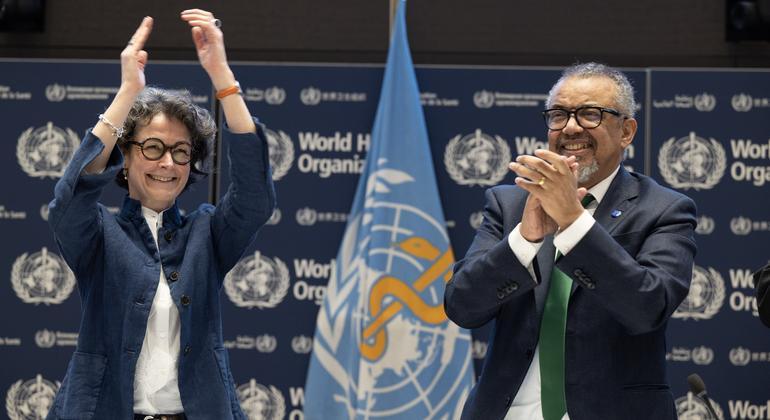Developed after more than three years of negotiations under the auspices of the World Health Organization (WHO), the draft describes a framework to strengthen international collaboration, equity and resistance to future global health threats.
“The nations of the world made history in Geneva today“Said General Director Tedros Adanom Ghebreyesus of the WHO.
“When they reached a consensus on the Pandemia agreement, they not only established a generational agreement to make the world safer. They have also shown that multilateralism is alive and well and that in our divided world, nations can still work together to find common land and a shared response to shared threats.“
‘One Health’ approach
The negotiations began in December 2021 in the height of the COVID-19 pandemic, when the Member States agreed the urgent need of an internationally binding international instrument and established the Intergovernmental Negotiation Agency (INB).
The process included 13 formal rounds of negotiations, many of which extended until the early hours, which culminated in Wednesday’s consensus after a final session during the night.
The key elements of the proposed agreement include a commitment to a “health” approach to the prevention of pandemic, the strongest national health systems, the creation of a coordinating financial mechanism and the creation of a globally coordinated supply chain and a logistics network for health emergencies.
The draft also proposes a new pathogen access system and sharing benefits, greater support for the transfer of technology and knowledge, as well as the construction of capacity, and describes a national and multidisciplinary emergency workforce of national and multidisciplinary emergency.
National sovereignty confirmed
The text also affirms national sovereignty in public health decisions. Explicitly establishes that nothing in the agreement gives whom the authority to demand health measures, such as closures, vaccination campaigns or border closures.
The draft will now be presented for its consideration to the 78th World Health Assembly, the highest UN forum for global health, which will begin on May 19. If adopted, it will be subject to ratification by individual nations.
According to media reports, the United States did not participate in the final round of negotiations, after its January announcement to withdraw from the global health agency, and would not be subject to the PACT.
A vision of the closing session of the Intergovernmental Negotiation Agency (INB).
An advance for health equity
Speaking at the end of the meeting, WHO general director, Tedros, praised the negotiating teams and the leadership of INB for their perseverance and shared purpose.
“This achievement is not just a diplomatic success“, Said.” It reflects its resistance, unworthy unity and commitment to the health and well -being of people everywhere. “
The co -chair of INB, Matsoso in South Africa, described the result a great advance for health equity.
“Negotiations have sometimes been difficult and prolonged. But This monumental effort has been sustained by the shared understanding that viruses do not respect borders: that no one is safe from pandemics until everyone is safe“She said.
Co-president Anne-Claire Amprau co-president of France added that the agreement feels the basis for a stronger and more equitable global health security architecture.
“This is a historical agreement for the security of health, equity and international solidarity,” he said.
Learn from Covid-19, looking to the future
The agreement arises after the COVID-19 pandemic, which presented critical vulnerabilities in global health systems and inequalities marked in access to diagnoses, treatments and vaccines. The virus charged almost seven million lives worldwide, economies severely interrupted and overwhelmed health services worldwide.
At the same time, the pandemic triggered the largest vaccination campaign in history, with more than 13.3 million doses managed worldwide in April 2023.
Looking towards the future, Tedros emphasized the long -term meaning of the agreement.
“The importance of this agreement goes beyond our current challenges,” he said.
“It is vital for future generations, for our children and grandchildren. By building a strong framework for the preparation and response of the pandemic, we ensure that they inherit a safer and healthier world.“




